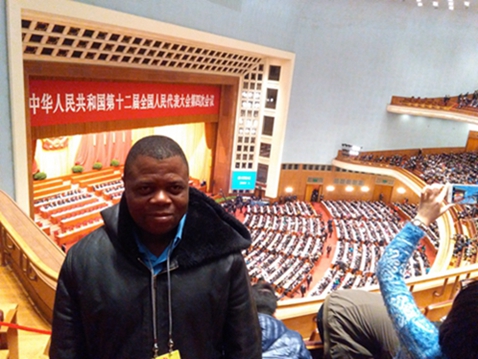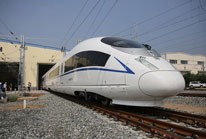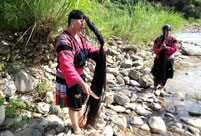

In the committee report, Yu, outlined that deepening reform took place in 2015, with the implementation of major policies.
Major among them was ensuring proper understanding of the CPPCC in order to maintain a correct political direction, adhering to structure of deliberation to make political consultations more fruitful; strengthening the CPPCC functions of the democratic oversight by adhering to a problem-oriented approach and promoting ethnic unity and religious harmony to bring together the will and strength of the people.
Touching of China’s foreign relations, Yu said the committee strengthened foreign contacts to develop a favorable external environment for China’s development.
He also used the occasion to present the Committee’s Five-Year plan which started this year.
My coverage at the Parliament continued on March 5, 2016, during the opening of fourth session of NPC, where Premier Li Keqiang reported on the work of the government in 2015.
China experienced major boost in economy, with its GDP reached at 67.7 trillion yuan, representing an increase of 6.9% over the previous year; a growth Li said was rare and faster than most of the major economies in the world. He reported that a high rate of economic development was maintained and living standards improved.
The Chinese Premier also used the occasion to outline plans for the government in 2016.
It was a colorful ceremony as deputies (members of the Parliament), and following the two events heads of various ministries and agencies gave their reports at press conferences and in sessions.
NPC is the lawmaking and supreme organ of state power and deputies (lawmaker) to the NPC are elected by the provinces, autonomous regions and municipalities directly under the Central Government, and by the armed forces. Candidates for deputies to the people's congress at various levels are nominated on the basis of electoral districts or electoral units. The political parties and various people's organizations may either jointly or separately recommend candidates for deputies.
Another thing I observe is that Chinese journalists highlight activities aimed at attracting more investment opportunities to their country. This developmental oriented reporting, however, is based on the enabling environment created by the government.
Most countries in the world perceive China as a place where there is no democracy because of the one-party rule. But some others argue the benefit of multi-party system with chaos and at last no benefit in the advancement of the country.
Regarding the consistent of the political system in China and the good foundation the CPC has sustained, Jin Canrong, Professor and Associate Dean of the School of International Studies at the Renmin University of China (RUC) said: “We learn from our ancestors, and if anyone wants to destroy China, you must destroy our culture first; which is very difficult.”
Possibly because of the entrenched system and the successes it has made over time, many Chinese say it will be a disaster if multiplicity of parties is allowed for such a country that has nearly 1.4 billion human beings. They argue that there will be hundreds of political parties with diverse political views. According to him, many opposing political views will not help China because of the population, because any attempt to do that will hurt the country and its growth.

The author in the chamber of the Great Hal of the People in Beijing
Above all, the Chinese are satisfied with the government, as indicated in areas I have visited around China so far. Most of the people’s conversations are more on how the world can learn from their political system and economic development and create peaceful environment.
There is a high level of nationalism among the Chinese, and as such, experts, scholars and prominent figures in the Chinese public diplomacy have founded a non-governmental organization - the China Public Diplomacy Association (CPDA); the sponsor of the exchange programs of African journalists in China.
China is a very large country and with large population; but growth in all of its sectors, have been described as the best way to address human rights.
Political leaders say the country cannot make sustainable progress in isolation, and so they embarked on a policy to strengthen relations with the world; that led to more attention to the China-Africa Cooperation.
While China is one country, Africa is not and deals with China in the relationship as disparate 54 states, making it difficult for integrated action to emulate China fully in the course and quest for growth and development of the continent.
Africa is the world's second-largest and second-most-populous continent. At about 30.37 million square km (11.7 million square miles) including adjacent islands, it covers six percent of Earth's total surface area and 20.2 percent of its total land area. With 1.1 billion people as of 2013, it accounts for about 15% of the world's human population. It contains 54 sovereign states (countries), nine territories and two de facto independent states with limited or no recognition, the continent with the world’s highest number of countries.
Due to such partitions with countries having individual sovereignty, it is impossible for Africa to unite like China.
But Africans have to learn from China to foster economic growth and development; and the political will must be holistic and targeted.
Fredrick P. W. Gaye is the News Editor of In Profile Daily Newspaper in Liberia, a fellow at the China Africa Press Center (CAPC) and an intern at People’s Daily Online. He can be reached by: fgaye.inprofile@gmail.com
 |
 World's fastest bullet train to start operating next month
World's fastest bullet train to start operating next month Huangluo: China's 'long hair village'
Huangluo: China's 'long hair village' Spectacular bridge with one of the tallest piers in the world
Spectacular bridge with one of the tallest piers in the world Magnificent view of Hukou Waterfall
Magnificent view of Hukou Waterfall A glimpse of Stride 2016 Zhurihe B military drill
A glimpse of Stride 2016 Zhurihe B military drill US Navy chief tours Liaoning aircraft carrier
US Navy chief tours Liaoning aircraft carrier Chinese American woman wins Miss Michigan
Chinese American woman wins Miss Michigan Centenarian couple takes first wedding photos
Centenarian couple takes first wedding photos Traditional Tibetan costumes presented during fashion show
Traditional Tibetan costumes presented during fashion show Top 10 livable Chinese cities
Top 10 livable Chinese cities Top 20 hottest women in the world in 2014
Top 20 hottest women in the world in 2014 Top 10 hardest languages to learn
Top 10 hardest languages to learn China’s Top 10 Unique Bridges, Highways and Roads
China’s Top 10 Unique Bridges, Highways and Roads Chinese athletes switch nationality for opportunities, welfare
Chinese athletes switch nationality for opportunities, welfare With another Olympic gold, Lang Ping rekindles national pride
With another Olympic gold, Lang Ping rekindles national pride Who holds the purse strings?
Who holds the purse strings? Chinese author Hao Jingfang wins Hugo Award for Best Novelette with ‘Folding Beijing’
Chinese author Hao Jingfang wins Hugo Award for Best Novelette with ‘Folding Beijing’Day|Week